French culture takes centre stage in Covid protest
- Published
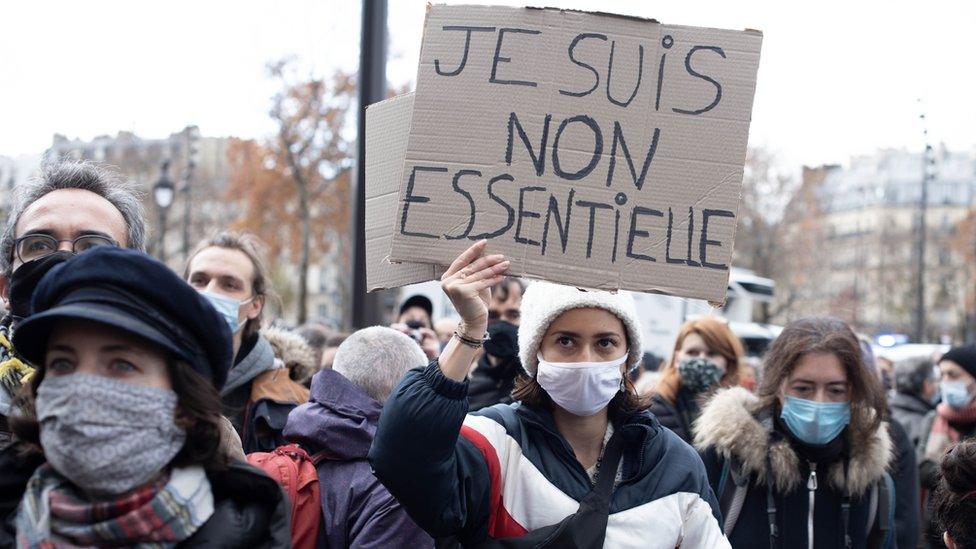
"I'm non-essential" declares one of the protesters in the Place de la Bastille in central Paris
Hundreds of actors, theatre directors, musicians, film technicians and critics, and many others from the world of French culture gathered in the heart of Paris and other cities on Tuesday to protest against the government's shutdown of culture venues because of Covid-19.
Cinemas, theatres, museums and concert halls had been set to reopen, but days in advance Prime Minister Jean Castex announced a change of heart in response to France's stubbornly high infection rate.
No reopening will take place now until at least 7 January - a decision Mr Castex said was "particularly painful for us".
Holding slogans like "we're going to die, and not even on stage", some of the demonstrators told the BBC of their anger and distress at the lockdown.

Lorraine Tisserant, opera singer, 33
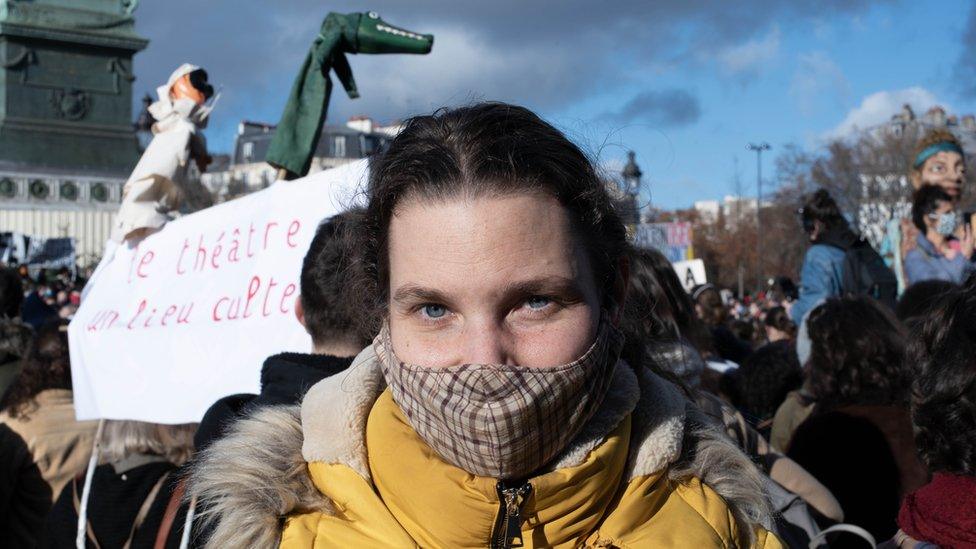
Among the protesters was Lorraine Tisserant, who believes her profession has bent over backwards to keep opera houses open and feels the government has neglected the culture sector in its response to the crisis.
"Many shows have been produced since the beginning of the pandemic that fully observed the new sanitary measures.
"I'll be optimistic when the government proves it really is interested in culture," she says, adding that in the meantime she'll be rehearsing for when it is finally time for the curtain to come up again.
The prime minister said he understood "how prepared the cultural sector was, that the artists rehearsed, that all sectors were mobilised, that everything was ready for the curtains to come up and the screens to light up".
Emilie Renard, puppeteer, 52
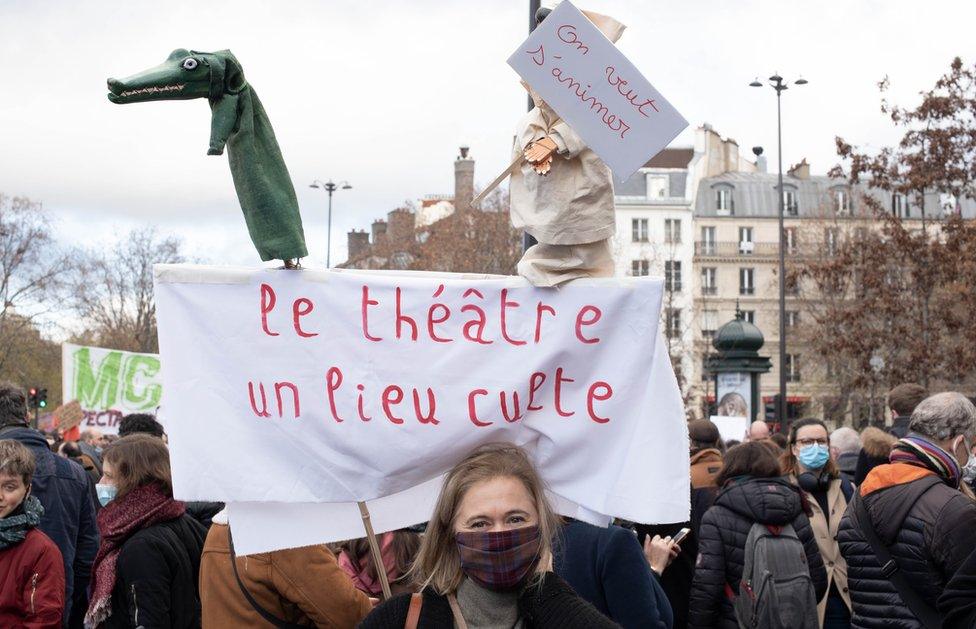
"Theatre is a place of worship" reads this puppeteer's poster
"I want to entertain people, make children laugh," declares puppeteer Emilie Renard whose puppet shows have had to stop. "It's not about money, the company can get subsidies from the government, but I just want to work."
Theatres, cinemas and other venues reopened after the first lockdown in June with new sanitary measures, but they shut again on 29 October, a day after President Emmanuel Macron imposed restrictions on non-essential shops, bars and anywhere receiving the public.
"Before entering another lockdown, I respected all the measures," says Emilie. "We didn't witness any clusters in theatres," she points out. In the meantime, she has been doing short videos for her young audience to watch online.
Emmanuel Goepfret, musician, 32
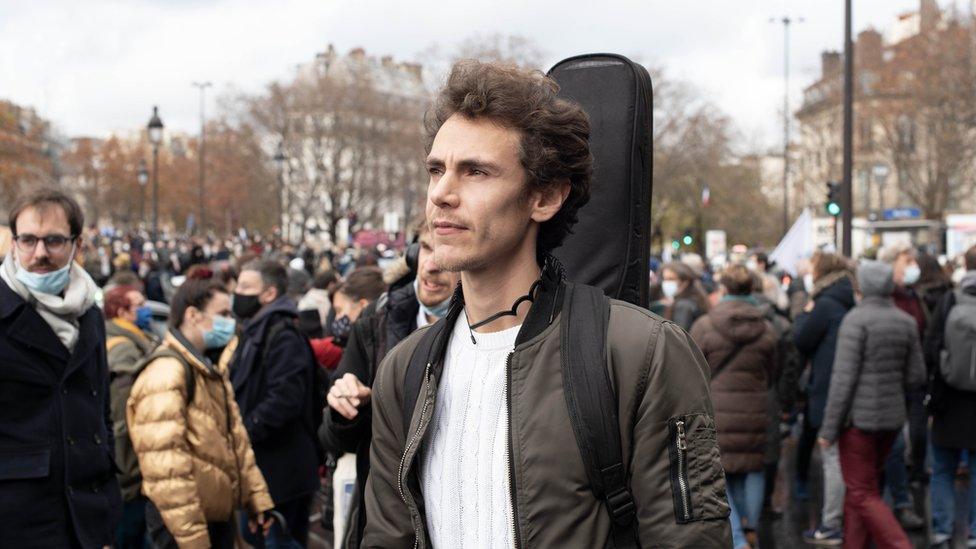
"I breathe, therefore I am," says multi-instrumentalist Emmanuel Goepfret, who wants decision-makers to know that health is not just about the body but about everything that is good for the mind and soul.
"Music saved me when I was being depressed," he says. "It's an outlet, it lets out all the sadness that is inside us."
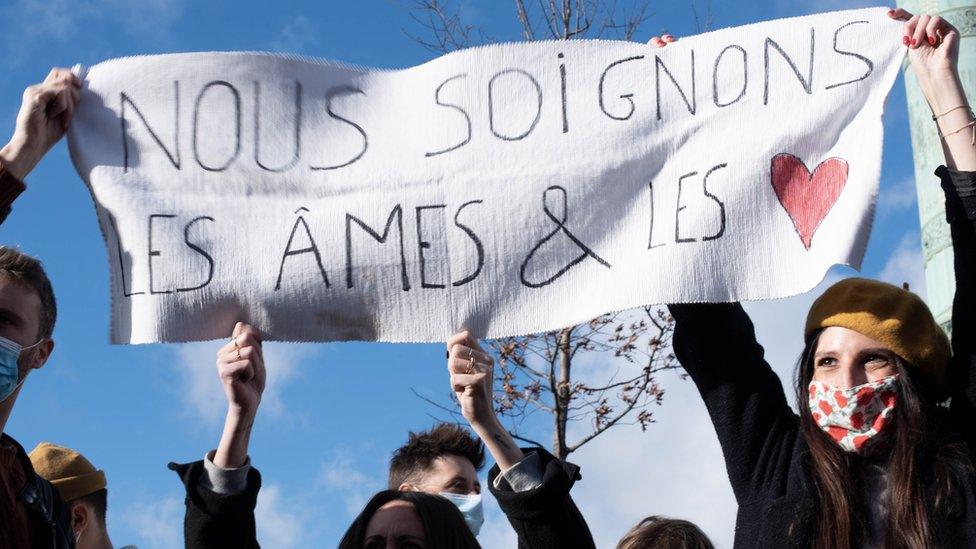
"We care for souls and hearts," reads this protest banner
Véronique Genest, actress, 64
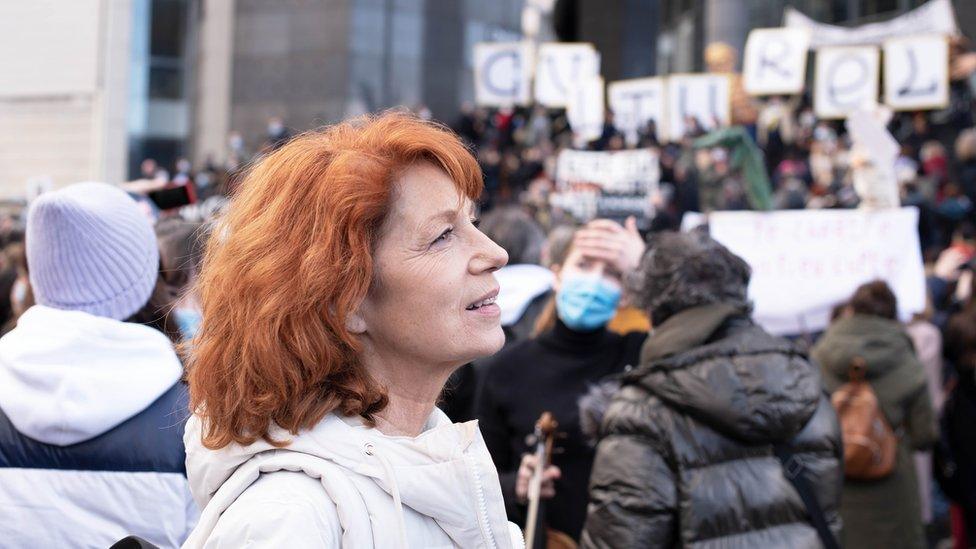
Véronique Genest is widely known for portraying a police superintendent on French TV for 23 years.
"Like many, I do not understand what's going on right now," she declares, complaining that people are being treated like children.
"Culture is in danger," she warns.
The culture sector has launched a legal challenge to the measures, just as catering workers and the ski industry have done, too.
Lionel Amadote, dancer and dance teacher

Professional dancer Lionel Amadote also complains "artists aren't important to the government".
As a professional, he is allowed to practise but does not know when he will be able to get back on stage. "Will we be able to perform in two months, three months?" he wonders.
Tiphaine Froid, stage director, 24
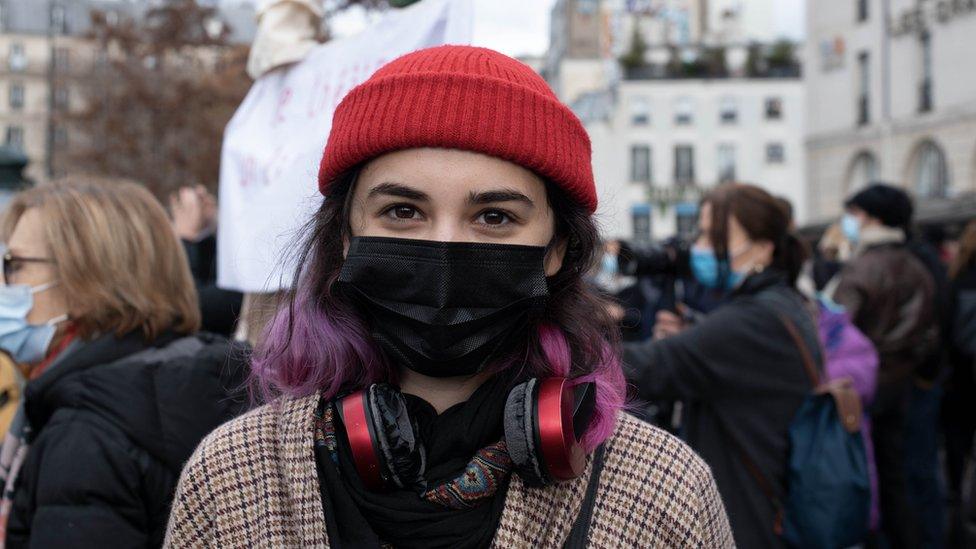
"My play has been postponed twice," says Thiphaine Froid, who finds it dispiriting working "without knowing if it will ever go beyond the walls of her living room".
"The situation demands much adaptability, it takes a lot of sacrifice," she said.
Lionel Massétat, theatre director, 54
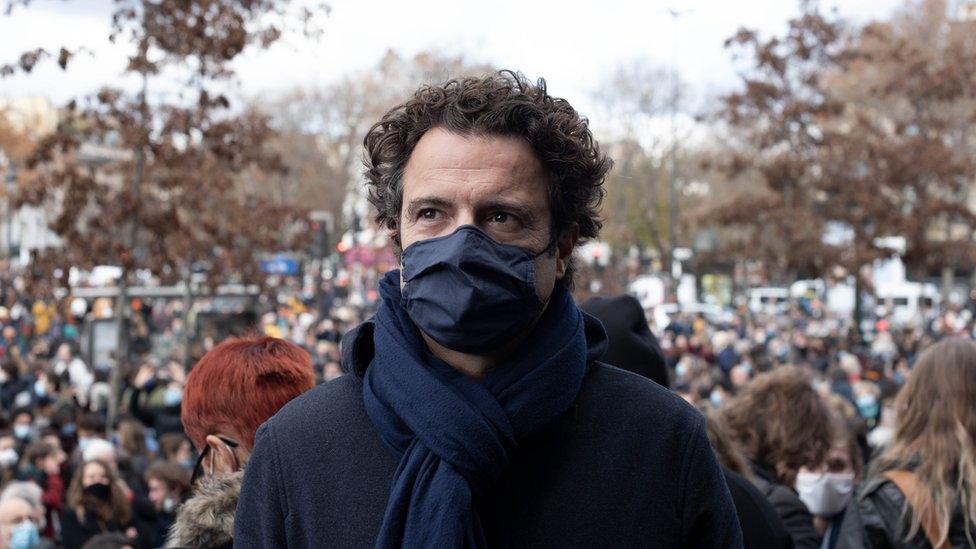
Among those gathered at the Bastille was theatre director Lionel Massétat, 54, who complained that he and his colleagues felt like they were "being treated like children".
He spoke of the recent murder of a teacher by a militant Islamist near Paris and of the debate surrounding French republican values.
"After the murder of Samuel Paty, there was this huge opportunity to affirm what we were, the values we defended, including freedom of expression, the freedom to come together, to think together, to be together beyond our differences."
Aurélia Tastet, actress, 38
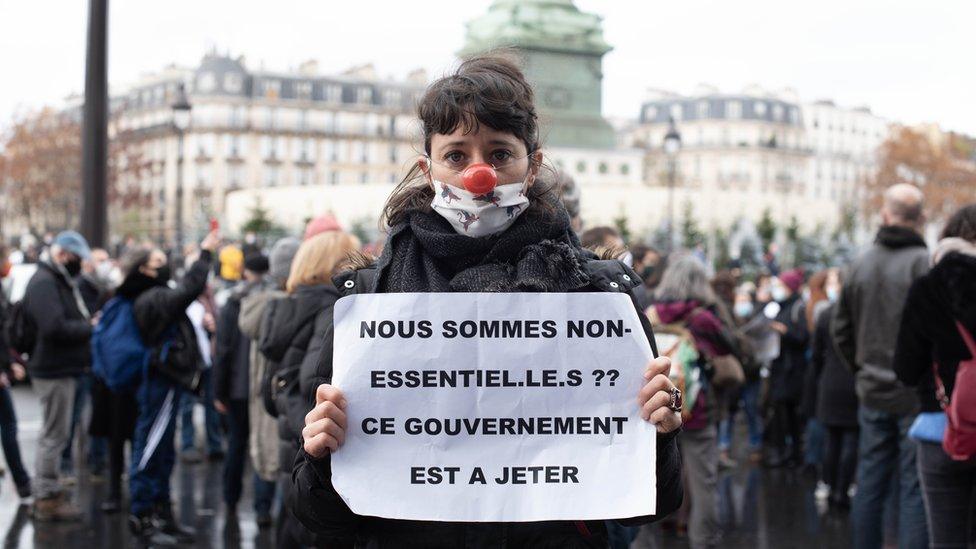
"We're non-essential? It's the government that needs dumping," reads Aurélia Tastet's poster
Complete with red nose, actress Aurélia Tastet, 38, is determined to state loud and clear that she is not "non-essential" - the term used by the French government to label activities that have had to stay shut.
Her voice cracking with emotion, she says producing wealth is more than just a narrow economic term.
Paul Olinger, chief film operator, 24
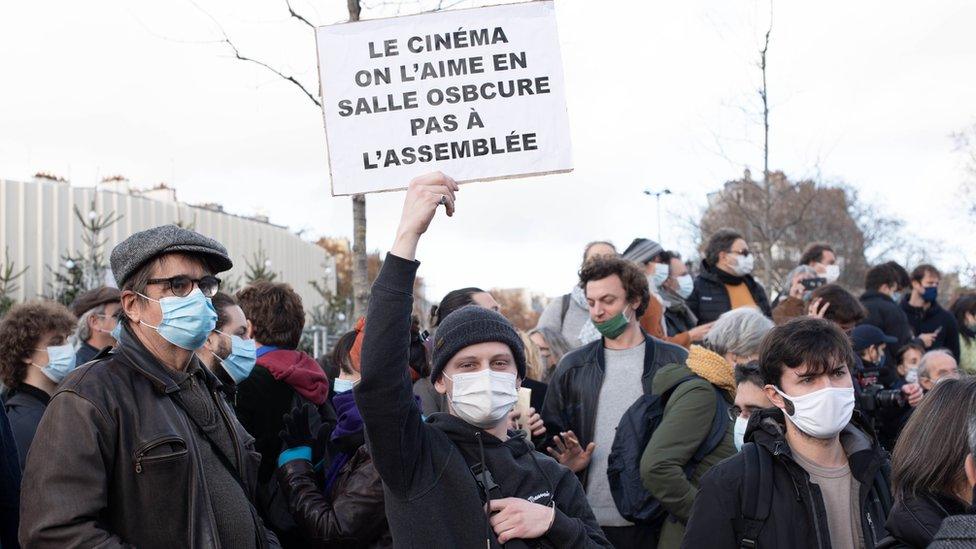
"We like fiction in movie theatres, not in parliament," reads Paul's poster
Paul Olinger finds it absurd to see Paris's transport system and shopping centres clogged up "while the cultural places are closed down".
He feels lucky that film shooting has been allowed to start up again, but his concern now is how films will be shown in future. "They will be on streaming platforms, and this is the consequence of the crisis."
All photographs by Marianne Baisnée.

CHRISTMAS: What are the Christmas restrictions around Europe?
RESTRICTIONS ACROSS EUROPE: Texting for permission to go out: Europe's lockdown rules
LATEST GLOBAL SPREAD: Tracking the global pandemic: Where has been hit hardest?
TRAVEL: What are the UK's rules?
LOOK-UP TOOL: How many cases in your area?

- Published25 June 2021
